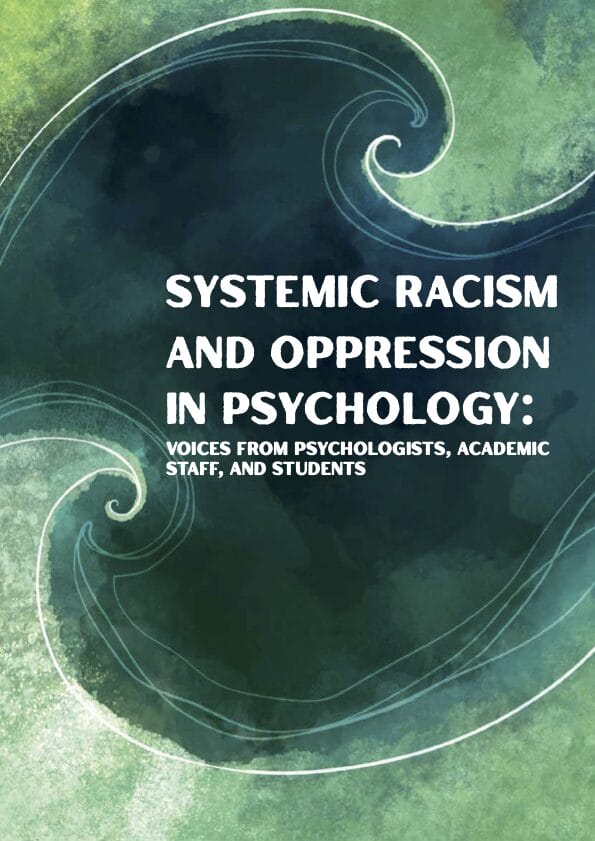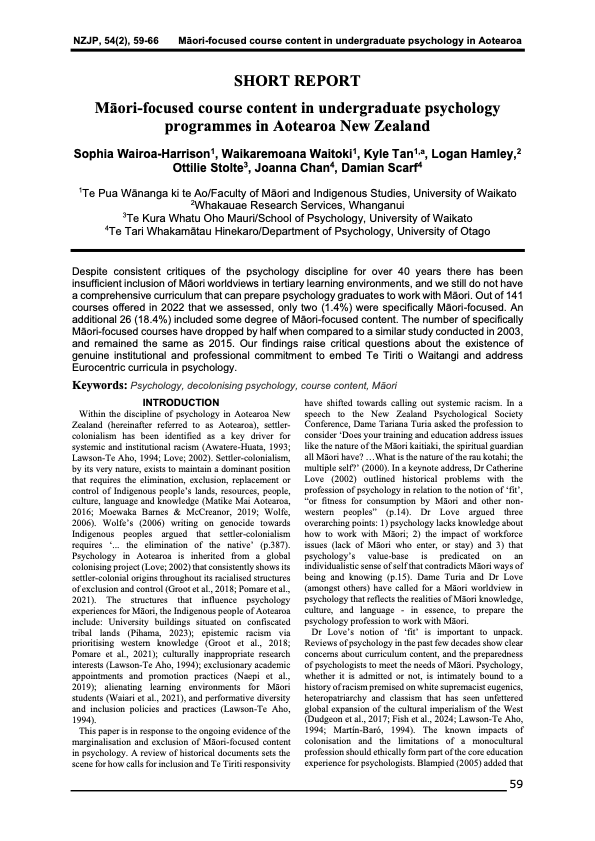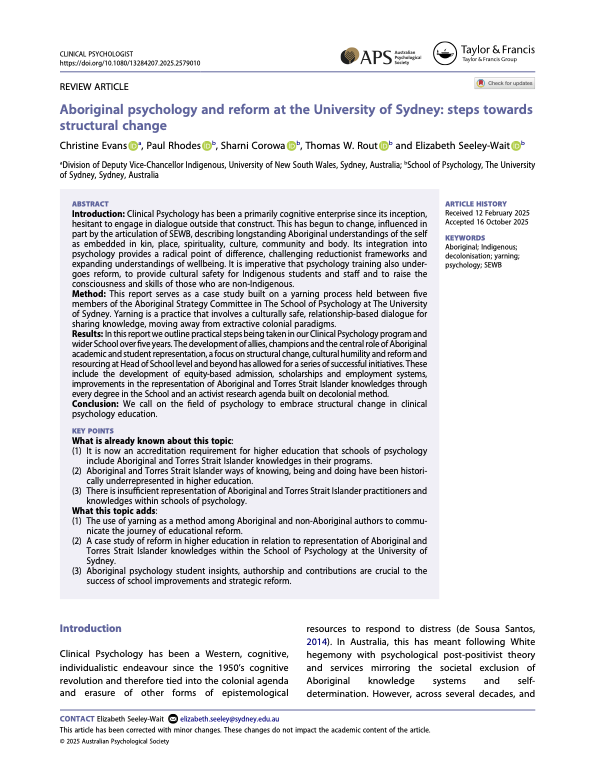Systemic Racism and Oppression in Psychology: Voices from Psychologists, Academic Staff, and Students

Psychology must reassess its training approach, as the current monocultural paradigm not only causes harm, but also fails to equip psychologists with the knowledge needed to provide culturally appropriate care for Māori, Pacific, Asian, and other minoritised groups. Findings from this report contribute to the growing evidence of the urgent need to address barriers preventing […]
Māori-focused Course Content in Undergraduate Psychology Programmes in Aotearoa New Zealand

Despite consistent critiques of the psychology discipline for over 40 years there has been insufficient inclusion of Māori worldviews in tertiary learning environments, and we still do not have a comprehensive curriculum that can prepare psychology graduates to work with Māori. Out of 141 courses offered in 2022 that we assessed, only two (1.4%) were […]
Aboriginal psychology and reform at the University of Sydney: steps towards structural change

Introduction Clinical Psychology has been a primarily cognitive enterprise since its inception, hesitant to engage in dialogue outside that construct. This has begun to change, influenced in part by the articulation of SEWB, describing longstanding Aboriginal understandings of the self as embedded in kin, place, spirituality, culture, community and body. Its integration into psychology provides […]
Considering cultural responsiveness in the creation of the International Competences for Undergraduate Psychology (ICUP) model: What can psychology learn

This article aims to describe the development of foundational competencies relevant to cultural responsiveness (CR), within the context of the International Competences for Undergraduate Psychology (ICUP) model (Nolan et al., 2025). The underlying premise of the ICUP model is that the acquisition of undergraduate-level foundational psychology competences can and should have high value in personal, work, […]
Hearing Australian Aboriginal stories to develop recommendations towards improving the psychology discipline: an Indigenous yarning methodological perspective.

The dominant western scientific methodology and standards are being challenged by a global academic push by Indigenous peoples to preference the use of culturally informed and appropriate Indigenous methodologies to produce collective benefits for communities. This article describes a methodology grounded by an Indigenous research paradigm, embodied through an Indigenous standpoint lens, and underpinned by […]
Decolonizing psychology education in Australia through the Australian Indigenous Psychology Education Project

There is a critical need for Indigenous knowledges in psychology as a matter of epistemic justice and achieving health equity for Aboriginal and Torres Strait Islander peoples. In Australia, Indigenous psychologists are at the forefront of the decolonizing psychology movement by challenging the Western hegemony and privileging Indigenous knowledges in psychology. Situated within this movement, […]
The contribution of evidence-based practice and the practice-based evidence approaches to contemporary Australian psychology: implications for culturally safe practice

Psychological practice emphasises the importance of using the best available evidence to ensure accountability and promote positive outcomes for individuals and communities. These expectations are critical for community trust; however, without adequate consideration of broader processes of knowledge production, this focus can marginalise populations and perpetuate health inequities, such as those experienced by Aboriginal and […]
Decolonising tertiary psychology programs in Australia: privileging Aboriginal and Torres Strait Islander peoples’ voices

Objective The Australian Indigenous Psychology Education Program has paved the way for Indigenising and decolonising psychology programs. While Indigenisation and decolonisation of psychology programs are not yet consistent, exemplar initiatives have emerged within recent times. This paper showcases these exemplars, providing details about the “how to” privilege Indigenous knowledges and decolonising practices. Method A qualitative […]
Decolonising tertiary psychology education in Australia: Processes, challenges and opportunities of curricula change

Australian psychology higher education and training has historically excluded Aboriginal and Torres Strait Islander peoples’ knowledge systems which has profoundly shaped the discipline, including its cultural responsiveness. Decolonising psychology education offers a systemic approach to improve education and practice, and, in turn, the cultural responsiveness of psychology. Decolonising psychology higher education has become a focal […]
Indigenising Curriculum at The University of Queensland

This publication is a collection of scholarly chapters exploring Indigenising the curriculum across diverse disciplines at the University of Queensland (UQ). The edited collection will be framed by the Indigenising Curriculum Design Principles developed by Tracey Bunda and the Indigenising Curriculum Working Party (Bunda, 2022) and explores the pedagogies, processes, benefits and difficulties of Indigenising […]
AIPEP Learning Resource: Working Together and the Psychology Board of Australia Professional Competencies for Psychology – Competency 8 Resource Map

The AIPEP Learning Resources aims to support Ahpra registered psychologists build their capacity to meet Psychology Board of Australia’s Professional Competency 8: Demonstrates a health equity and human rights approach when working with Aboriginal and Torres Strait Islander peoples. This online resource maps chapters from the Working Together (2014) textbook against the Psychology Board of […]
Yarning sessions to facilitate cultural responsiveness and decolonising the curriculum in a university psychology setting

Psychology higher education providers play a critical role in growing a culturally safe psychology workforce by engaging in culturally responsive practices, embedding Indigenous perspectives and decolonising curricula. We describe yarning sessions that aimed to facilitate collective learning, reflexivity and decolonising praxis. They were led through relationship and governance from the Australian Indigenous Psychology Education Project […]
Decolonising tertiary psychology student support in Australia: empowering Aboriginal and Torres Strait Islander psychology students

Objective Aboriginal and Torres Strait Islander people, including psychologists, are actively leading and decolonising psychology. The focus of decolonising psychology is on epistemic justice for Indigenous knowledges and delivering culturally responsive services. Indigenous psychologists play a vital role in the decolonising process. Despite recommendations and initiatives aimed at decolonising psychology tertiary programs, such as increasing […]
Toward culturally responsive psychology higher education courses: psychologists’ perspectives on preparedness to work with Aboriginal and Torres Strait Islander clients

Background Psychology course regulatory standards for Australian universities have evolved in that universities are required to include cultural responsiveness in psychology curriculum and demonstrate graduate competencies for working with Aboriginal and Torres Strait Islander clients. Aim This study aimed to explore psychologists’ perspectives about the higher education (HE) psychology curriculum in relation to their preparedness […]
Working Together in Psychology Higher Education

Dr. Stacey McMullen, Professor Monica Thielking, Professor Jeneva Ohan and Ms Belle Selkirk discussing the significance of the Working Together book in psychology higher education and how they’ve used it throughout their careers as educators and psychologists. This event was part of a series of webinars commemorating the tenth anniversary of the seminal text book, […]
Decolonising psychology: Why voice matters

Pat Dudgeon, Australia’s first registered Indigenous psychologist, and her colleagues Dawn Darlaston-Jones and Joanna Alexi make the case for decolonising psychology and celebrate the incorporation of Indigenous knowledge and learning into all Australian psychology curricula.
Decolonising Psychology – Part 1

In this two-part series, Professor Pat Dudgeon AM, Belle Selkirk and Dr Joanna Alexi (Transforming Indigenous Mental Health and Wellbeing) share their experiences of decolonising psychology and take listeners on a journey through the impactful work of the Australian Indigenous Psychology Education Project (AIPEP). Listeners are also recommended to read the corresponding factsheet: Psychology education […]
Psychology education needs to reflect the lives of aspiring Aboriginal and Torres Strait Islander students

To support aspiring Aboriginal and Torres Strait Islander students to engage in psychology education in Australia, psychology curricula and teaching and learning programs should reflect Aboriginal and Torres Strait Islander worldviews and lived experiences.
Australian Indigenous Psychology Education Project (AIPEP) – Curricular approaches to increasing cultural competence and Indigenous participation in psychology education and training

Dudgeon, P. (2019). Australian Indigenous Psychology Education Project (AlPEP) – Curricular approaches to increasing cultural competence and Indigenous participation in psychology education and training. Transforming Indigenous Mental Health and Wellbeing Grant, The University of Western Australia, Poche Centre for Indigenous Health. https://timhwb.org.au/wp-content/uploads/2021/05/AIPEP-Final-Report.pdf
Boongs, Bigots, and Bystanders: Indigenous and Non-Indigenous Experiences of Racism and Prejudice and their Implications for Psychology in Australia

Critical Reflexivity in Indigenous and Cross-cultural Psychology: A Decolonial Approach to Curriculum

Highlights Critical reflexivity is a mechanism for working toward decoloniality in higher education. We analyzed Indigenous and cross-cultural psychology students? written reflections. Analyses revealed that students negotiate experiences of discomfort and uncertainty in the classroom. Findings support the value of discomfort for prompting transformations among students. We pose a commentary on the tensions inherent to […]
Indigenous youth wellbeing in higher education: a systematic literature review of qualitative studies

Completing a higher education degree is a game changer for the success of Indigenous youth. However, there is a paucity of research which explores the enablers of and barriers to Indigenous higher education youth (18–25 years) wellbeing. This systematic literature review aimed to explore the nature and scope of international research that engages with Indigenous youth […]
Calling out Racism in University Classrooms: The Ongoing Need for Indigenisation of the Curriculum to Support Indigenous Student Completion Rates

Aboriginal and Torres Strait Islander students continue to experience racism in Australian university classrooms. The Reconciliation Australia Barometer report (2022, p. 5) recently noted that experiences of racial prejudice have increased for Indigenous people with 60% of Indigenous people who responded to the survey experiencing at least one form of racial prejudice in the past […]
The importance of Indigenous centres/units for Aboriginal and Torres Strait Islander students: ensuring connection and belonging to support university completion

Indigenous student completion rates remain very low relative to non-Indigenous students. Some universities have higher Indigenous student completion rates than the national average but research-based evidence of these universities as ‘success models’ is limited. Drawing on findings from interviews with Indigenous university graduates and staff as part of a National Centre for Student Equity in […]
Psychologists’ experiences towards culturally responsive practices to strengthen social and emotional wellbeing with Aboriginal and Torres Strait Islander clients

Objective This study aimed to explore psychologists experiences when providing culturally responsive psychological practice working with Aboriginal and Torres Strait Islander clients. Method Psychologists (N = 108, Female 83.2%, Male 16.8%, Aboriginal 13.9%, non-Indigenous 86.1%, age range 22–83) responded to an electronic mixed method survey. Statistical and content analysis were undertaken using data gathered to address the […]
